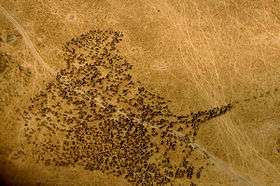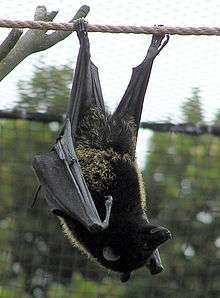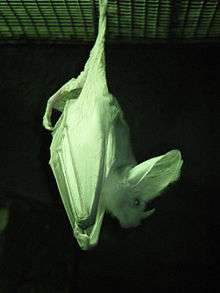List of bats by population
| The population of mammals |
|---|
 |
This is a list of bat species by global population. While numbers are estimates, they have been made by the experts in their fields. For more information on how these estimates were ascertained, see Wikipedia's articles on population biology and population ecology.
This list is not comprehensive, as not all bats have had their numbers quantified.
| Common name | Binomial name | Population | Status | Trend | Notes | Image |
|---|---|---|---|---|---|---|
| Christmas Island Pipistrelle | Pipistrellus murrayi | 4[1] | CR[1] | Common and widespread until the 1980s. Population here was recorded in January 2009. An immediate capturing project was requested to save the species, and efforts for approval included a personal meeting with then-Australian environment minister Peter Garrett. Due to a potential cost of a few hundred thousand dollars, the government decided against quick action and instead undertook a bureaucratic feasibility study. After its eventual assent in August 2009 a team of experts travelled to Christmas Island to capture the remaining individuals but only one was detected, which managed not to be caught. Its subsequent disappearance may be one of very few times extinction has been witnessed first-hand. Reasons for the bat's decline remain unknown.[1][2] | ||
| Cuban Greater Funnel-eared Bat | Natalus primus | 100[3] | CR[3] | Maximum estimate. Only found in a single cave.[3] | ||
| Seychelles Sheath-tailed Bat | Coleura seychellensis | 100[4] | CR[4] | Maximum estimate for mature individuals.[4] | ||
| Bulmer's fruit bat | Aproteles bulmerae | 160[5] | CR[5] | Only one colony is known to exist.[5] | ||
| Jamaican flower bat | Phyllonycteris aphylla | 250[6] | CR[6] | Colonies only at Marta Tick Cave and Stony Hill Cave.[6] | ||
| Flat-headed myotis | Myotis planiceps | 250[7] | EN[7] | Maximum estimate for mature individuals.[7] | ||
| Bonin Flying Fox | Pteropus pselaphon | 300[8] | CR[8] | Maximum estimate.[8] | ||
| Arnhem leaf-nosed bat | Hipposideros inornatus | 300[9] | VU[9] | Maximum estimate for mature individuals.[9] | ||
| New Georgian Monkey-faced Bat | Pteralopex taki | 500[11] | EN[11] | Estimate is for mature individuals.[11] | ||
| Canary big-eared bat | Plecotus teneriffae | 500 – 2000[12] | EN[12] | |||
| Thailand Roundleaf Bat | Hipposideros halophyllus | 1000 – 1400[13] | EN[13] | |||
| Livingstone's fruit bat | Pteropus livingstonii | 1200[14] | EN[14] |  | ||
| Coastal sheath-tailed bat | Taphozous australis | 1200 - 10 000[15][16] | NT[15] | |||
| New Caledonia Wattled Bat | Chalinolobus neocaledonicus | 1500[17] | EN[17] | Maximum estimate from known colonies.[17] | ||
| Azores noctule | Nyctalus azoreum | 2000 – 5000[18] | EN[18] |  | ||
| Rodrigues flying fox | Pteropus rodricensis | 4000[19] | CR[19] |  | ||
| Kitti's hog-nosed bat | Craseonycteris thonglongyai | 6600[20] | VU[20] | | ||
| Ghost Bat | Macroderma gigas | 7000 – 9000[21] | VU[21] |  | ||
| Comoro rousette | Rousettus obliviosus | 7100 – 17 100[22] | VU[22] | |||
| Giant golden-crowned flying fox | Acerodon jubatus | 10 000[23] | EN[23] | Unknown[23] | Rough estimate; probably no more than 20 000.[23] |  |
| Banana bat | Musonycteris harrisoni | 10 000[24] | VU[24] | |||
| Pemba Flying Fox | Pteropus voeltzkowi | 19 000[25] | VU[25] | Increase from a few hundred in the early 1990s.[25] | ||
| Mauritian flying fox | Pteropus niger | 25 000[10] | EN[10] | Minimum estimate.[10] |  | |
| New Zealand lesser short-tailed bat | Mystacina tuberculata | 30 000[26] | VU[26] | Minimum estimate.[26] |  | |
| Madagascan flying fox | Pteropus rufus | 300 000[27] | VU[27] |  | ||
| Grey-headed flying fox | Pteropus poliocephalus | 320 000 - 674 000[28] | VU[29] | Estimates are based on incomplete knowledge of camp location and use.[28] |  | |
| Indiana bat | Myotis sodalis | 387 300[30] | EN[30] | Though numbers are large compared to other bats classified as endangered, this species is listed as such due to a >50% decline over the past decade.[30] |  | |
See also
References
- 1 2 3 4 Lumsden, L., Racey, P.A. & Hutson, A.M. (2010). "Pipistrellus murrayi". IUCN Red List of Threatened Species. Version 2012.2. IUCN. Retrieved 2012-11-20.
- ↑ Tim, Flannery (17 November 2012). "Unmourned death of a sole survivor". The Sydney Morning Herald. Retrieved 2012-11-21.
In an attempt to avert it I met Peter Garrett, then the environment minister, and warned him of the impending loss. I had brought offers of assistance and expertise from the Australian Mammal Society to his attention. The society was confident the species could be saved - at a cost of perhaps only a few hundred thousand dollars. But Garrett was convinced by the orthodoxy that ecosystems rather than species should be the focus of the national conservation effort, and I got the message that nothing would be done.
- 1 2 3 4 Dávalos, L. & Mancina, C. (2008). "Natalus primus". IUCN Red List of Threatened Species. Version 2012.2. IUCN. Retrieved 2012-11-20.
- 1 2 3 4 Gerlach, J., Mickleburgh, S., Hutson, A.M. & Bergmans, W. (2008). "Coleura seychellensis". IUCN Red List of Threatened Species. Version 2012.2. IUCN. Retrieved 2012-11-20.
- 1 2 3 4 Hutson, T., Helgen, K., Flannery, T. & Wright, D. (2008). "Aproteles bulmerae". IUCN Red List of Threatened Species. Version 2012.2. IUCN. Retrieved 2012-11-20.
- 1 2 3 4 Koenig, S. & Davalos, L. (2015). "Phyllonycteris aphylla". IUCN Red List of Threatened Species. Version 2015. IUCN. Retrieved 2016-06-04.
- 1 2 3 4 Arroyo-Cabrales, J., Álvarez-Castañeda, S.T., S., Cuarón, A.D. & de Grammont, P.C. (2008). "Myotis planiceps". IUCN Red List of Threatened Species. Version 2012.2. IUCN. Retrieved 2012-11-20.
- 1 2 3 4 Ishii, N. & Maeda, K. (2008). "Pteropus pselaphon". IUCN Red List of Threatened Species. Version 2012.2. IUCN. Retrieved 2012-11-20.
- 1 2 3 Richards, G. & Milne, D. (2008). "Hipposideros inornatus". IUCN Red List of Threatened Species. Version 2012.2. IUCN. Retrieved 2012-11-20.
- 1 2 3 4 5 Jenkins, R.K.B., Tatayah, V. & Racey, P.A. (2008). "Pteropus niger". IUCN Red List of Threatened Species. Version 2012.2. IUCN. Retrieved 2012-11-20.
- 1 2 3 4 Hamilton, S., Helgen, K., James, R., Fisher, D. & Parnaby, H. (2008). "Pteralopex taki". IUCN Red List of Threatened Species. Version 2012.2. IUCN. Retrieved 2012-11-20.
- 1 2 3 Aulagnier, S., Juste, J., Palmeirim, J. & Alcaldé, J.T. (2008). "Plecotus teneriffae". IUCN Red List of Threatened Species. Version 2012.2. IUCN. Retrieved 2012-11-20.
- 1 2 3 Bates, P., Bumrungsri, S., Francis, C., Csorba, G. & Walston, J. (2008). "Hipposideros halophyllus". IUCN Red List of Threatened Species. Version 2012.2. IUCN. Retrieved 2012-11-20.
- 1 2 3 Mickleburgh, S., Hutson, A.M. & Bergmans, W. (2008). "Pteropus livingstonii". IUCN Red List of Threatened Species. Version 2012.2. IUCN. Retrieved 2012-11-20.
- 1 2 3 Hall, L., Thomson, B. & Richards, G. (2008). "Taphozous australis". IUCN Red List of Threatened Species. Version 2014.2. IUCN. Retrieved 2014-07-25.
- ↑ Clague, C., Coles R., Hall, L. & Richards, G. (1999). "Coastal Sheathtail Bat". The Action Plan for Australian Bats, Environment Australia. Australian Government. Retrieved 2014-07-25.
- 1 2 3 4 Brescia, F. (2008). "Chalinolobus neocaledonicus". IUCN Red List of Threatened Species. Version 2012.2. IUCN. Retrieved 2012-11-20.
- 1 2 3 Hutson, A.M., Aulagnier, S., Rainho, A. & Palmeirim, J. (2008). "Nyctalus azoreum". IUCN Red List of Threatened Species. Version 2012.2. IUCN. Retrieved 2012-11-20.
- 1 2 3 Mickleburgh, S., Hutson, A.M. & Bergmans, W. (2008). "Pteropus rodricensis". IUCN Red List of Threatened Species. Version 2012.2. IUCN. Retrieved 2012-11-20.
- 1 2 3 Bates, P., Bumrungsri, S. & Francis, C. (2008). "Craseonycteris thonglongyai". IUCN Red List of Threatened Species. Version 2012.2. IUCN. Retrieved 2012-11-20.
- 1 2 3 McKenzie, N. & Hall, L. (2008). "Macroderma gigas". IUCN Red List of Threatened Species. Version 2012.2. IUCN. Retrieved 2012-11-20.
- 1 2 3 Mickleburgh, S., Hutson, A.M. & Bergmans, W. (2008). "Rousettus obliviosus". IUCN Red List of Threatened Species. Version 2012.2. IUCN. Retrieved 2012-11-20.
- 1 2 3 4 Mildenstein, T., Cariño,A., Paul, S., Heaney, L., Alviola, P., Duya, A., Stier, S., Pedregosa, S., Lorica, R., Ingle, N., Balete, D., Garcia, J.J., Gonzalez, J.C., Ong, P., Rosell-Ambal, G. & Tabaranza, B. (2008). "Acerodon jubatus". IUCN Red List of Threatened Species. Version 2012.2. IUCN. Retrieved 2012-11-20.
- 1 2 3 Arroyo-Cabrales, J. and Ospina-Garces, S. (2015). "Musonycteris harrisoni". IUCN Red List of Threatened Species. Version 2015. IUCN. Retrieved 2016-06-04.
- 1 2 3 4 Mickleburgh, S., Hutson, A.M., Bergmans, W. & Howell, K. (2008). "Pteropus voeltzkowi". IUCN Red List of Threatened Species. Version 2012.2. IUCN. Retrieved 2012-11-20.
- 1 2 3 4 O'Donnell, C. (2008). "Mystacina tuberculata". IUCN Red List of Threatened Species. Version 2012.2. IUCN. Retrieved 2012-11-20.
- 1 2 3 Andriafidison, D, Cardiff, S.G., Goodman, S.M., Hutson, A.M., Jenkins, R.K.B., Kofoky, A.F., Rabearivelo, A., Racey, P.A., Ranivo, J., Ratrimomanarivo, F.H. & Razafimanahaka, H.J. (2008). "Pteropus rufus". IUCN Red List of Threatened Species. Version 2012.2. IUCN. Retrieved 2012-11-20.
- 1 2 Department of the Environment (2014). "Pteropus poliocephalus". Species Profile and Threats Database. Department of the Environment, Canberra. Retrieved 2014-07-25.
- 1 2 Lunney, D., Richards, G. & Dickman, C. (2008). "Pteropus poliocephalus". IUCN Red List of Threatened Species. Version 2014.2. IUCN. Retrieved 2014-07-25.
- 1 2 3 4 Arroyo-Cabrales, J. & Ticul Alvarez Castaneda, S. (2008). "Myotis sodalis". IUCN Red List of Threatened Species. Version 2012.2. IUCN. Retrieved 2012-11-20.
This article is issued from Wikipedia - version of the 6/6/2016. The text is available under the Creative Commons Attribution/Share Alike but additional terms may apply for the media files.
